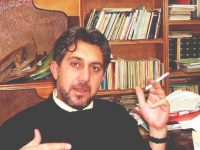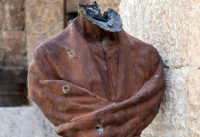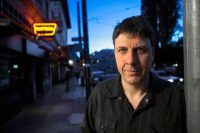March 16, 2016
Edited by David Sanders
Specimen Days
1585— Gerbrant A Bredero, Holland, poet/playwright (Klucht van de Koe), is born.
1757— Bengt Lidner, Swedish poet (Medea, Yttersa Domen), is born.
1839— René F Armand Sully-Prudhomme, France, poet, 1st Nobel winner (1901), is born.
1883— Ethel Anderson, Australian poet (d. 1958), is born.
1892— Cesar Vallejo, Peruvian/French poet (Los Heraldos Negros), is born.
1945— Pierre Drieu la Rochelle, French writer/poet, commits suicide at 52.
1945— Börries von Münchhausen, German poet (b. 1874), dies.

César Vallejo is dead. Everyone beat him
although he never does anything to them;
they beat him hard with a stick and hard also
with a rope. These are the witnesses:
the Thursdays, and the bones of my arms,
the solitude, and the rain, and the roads. . .
—from “Black Stone Lying On A White Stone” by César Vallejo (1892 – 1938)
“César Vallejo is dead.” – César Vallejo
World Poetry
IS Executes Respected Syrian Poet and Son for 'Apostasy'

Islamic State militants executed a prominent Syrian poet along with his son this week, family members have said. Mohammed Bashir al-Aani and his son Elyas were arrested in the eastern town of Deir Ezzor seven months ago and taken to an unknown location, thought to be an IS prison in the area, according to local news site Deir Ezzor 24. Militants executed the 56-year-old and his son on Thursday on charges of “apostasy,” the men's relatives told the site.
Turkish Poet Writes Apology to Russians for Downed Jet
Turkish poet Hüseyin Haydar has written an apology to Russians for a Russian military aircraft downed by his country's military and the death of a Russian pilot. In his verse entitled "An apology to the great Russian people", Haydar wrote that "fraternal bonds were severed right in front of our eyes".
Islamic State militants executed prominent Syrian poet Mohammed Bashir al-Aani along with his son Elyas this week.
Recent Reviews
Review: Prose Volume V 1963-1968; Prose Volume VI 1969-1973, by WH Auden
by Denis Donoghue

WH Auden (1907-1973) was a poet, librettist, playwright, an anthologist, man of letters, and everything but a literary critic. Princeton University Press is publishing his complete works, verse and prose, in (by my count) 10 beautiful volumes, splendidly edited by Edward Mendelson. The edition might be regarded as enforcing a claim that Auden was essentially what he became, a major American poet, brother to Walt Whitman, Emily Dickinson, Harold Hart Crane, TS Eliot, Ezra Pound, Wallace Stevens and Robert Frost, rather than the brilliant English poet of the 1930s which he started out as.
Book Review: Original Face by Jim Peterson
by Jenny Minniti-Shippey
In Jim Peterson’s latest poetry collection, confident storytelling links diverse voices—voices of lovers, fathers, queens of the circus and wide-eyed children. The poems take us from “a neighborhood where boys // play war on the streets and women / draw hearts and stars in the palms of their hands” to the paintings of Francisco Goya, whose subjects’ “eyes see cleanly through me into God // knows what: insects singing in the woods / behind me perhaps.”
As Ever, the River
by J. Mae Barizo
In Melissa Green’s early poems, there is always a river. Often it is the Squanicook, which runs through Northern Massachusetts and is part of the Merrimack River watershed flowing into the Atlantic. The river charts its path throughout her poems: “crimping silently;” “riven with ice;” changing “into an ancient self.” Green’s first book — The Squanicook Eclogues, was written as an extended elegy for her father; it was awarded prizes from the Poetry Society of America and the Academy of American Poets. Published in 1987, it was praised by poets such as Derek Walcott and Joseph Brodsky. A decade later, Norton published a memoir of her mental illness, Color is the Suffering of Light, and then there were many years of silence.
Circumstances and Entropy: On Frank Lima
by Patrick James Dunagan
The poetry world is ever fickle. Attention to the work of some poets takes off almost from the get-go, while for others the stars wax and wane over altering possible destinies. Take Frank Lima (1939-2013): a New York City-born protégé of Frank O'Hara and Kenneth Koch during the 1960s who truly came from "the streets," complete with bad habits ranging from petty crime to heroin use and alcoholism. His early work startled readers with its upfront presentation of these matters, along with a thorough routing of the incestuous and sexually promiscuous home environment in which he came of age. In Lima's case, however, his early books and presence among the very-in-crowd of fellow poets and artists in one of the most cosmopolitan cities in the world just wasn't enough to secure him a long-lasting wide readership. He eventually ceased writing poetry for a number of years, until he unleashed a surprising flourish of writing beginning in the 1990s, right up until his death in 2013. A reappraisal of his work is long overdue.
In 'The Swimmer,' John Koethe Navigates Riptides of Time, Memory
By Jim Higgins

In "Idiot Wind" (which shares a title with one of Dylan's bitterest songs), former Milwaukee poet laureate John Koethe questions the enterprise of making poems, judging his own performance short of ideal: "And yet I think a poem should be the 'metre-making argument' / Emerson called for, though the argument always peters out.” Far be it from me to argue with a guy who can quote Wittgenstein, but in the case of "The Swimmer," his 10th collection of poetry, Koethe is protesting too much.
Princeton University Press is in the process of publishing WH Auden’s complete works, verse and prose, in 10 volumes.
Broadsides
On the Miniature
by Kay Ryan
“To be miniature is to be swallowed by a miniature whale.”
This is wisdom I gleaned from experience. And when I say gleaned I mean picked up off the ground after the commercial harvesters had come through. This is wisdom nobody much wanted; I surely didn’t. Of course, much wisdom is things we never wanted to know. (Itself an additional piece of wisdom, again demonstrating how discouraging wisdom is.) But to return to the question of the miniature, we find imbedded in this prescient line the design flaw inherent in the impulse to miniaturize: all in the world you wind up doing is changing the scale of everything
Museum of Lost Objects: The Unacceptable Poet
By Kanishk Tharoor and Maryam Maruf

In early 2013, Islamist militants in north-west Syria chose a peculiar target. They decapitated a statue of the 11th Century poet and philosopher Abu al-Alaa al-Maarri. The statue of a turbaned man with glowering eyes, knotted eyebrows, and a robust beard used to sit near the central museum of Maarat al-Numan. It was twice life-sized and had been cast in bronze in the 1940s by a young Syrian sculptor, Fathi Mohammed. The statue was not old, nor was it of great artistic value but the man it depicted was a remarkable figure, whose ideas and way of life were at odds with his time. "Abu al-Alaa al-Maarri is regarded as one of the three foremost atheists in Islamic history," says Syrian art historian Nasser Rabbat. "The majority of Muslims would shun him."
In 2011 Islamist militants in northwest Syria decapitated a statue of 11th Century poet and philosopher Abu al-Alaa al-Maarri.
Drafts & Fragments
Rare Walt Whitman Letter, Written for a Dying Soldier, Found in National Archives
A recently discovered letter written by Walt Whitman on behalf of an illiterate dying soldier to the soldier's wife is seen at the National Archives of the United States in Washington.
By Michael E. Ruane

Pvt. Robert N. Jabo, of the 8th New Hampshire infantry, was dying of tuberculosis in Washington’s Harewood Hospital and needed to write to his family. The Civil War had been over for months. Most soldiers had gone home. And Jabo’s wife and six children were no doubt wondering where he was. But he was sick and illiterate. So a cheerful, bearded man who regularly visited hospitalized soldiers offered to write a letter for him.
New at PennSound: Previously Unreleased Robert Frost
by Chris Mustazza
As part of my work to excavate, digitize, and contextualize one of the first poetry audio archives in US, The Speech Lab Recordings, I’m thrilled to announce a significant addition to the collection: new digitizations of previously unreleased Robert Frost recordings, made in the Speech Lab in 1933 and 1934. These recordings, which may be the first recordings ever made of Frost, in one sense mark a departure from the aesthetic circumscription of the collection. Many of the poets who were recorded in Professors W. Cabell Greet and George W. Hibbitt’s Columbia University lab built for the study of American dialects operated in a modernist tradition of formal innovation. From the collection’s founding with the performance-forward, Dada-esque incantations of Vachel Lindsay through James Weldon Johnson’s Afro-Modernist scoring of speech sounds and Gertrude Stein’s proto-Language poetics, it’s clear that the editors favored a particular strain of modernism.
A few months after the Civil War ended, Walt Whitman wrote a letter for dying soldier Pvt. Robert N. Jabo. The letter has recently been discovered.
Poetry In the News
SMC English Professor Matthew Zapruder Named Poetry Column Editor for New York Times Magazine

Saint Mary's English professor and critically acclaimed poet Matthew Zapruder has been named the new poetry column editor for The New York Times Magazine. As the column editor, Zapruder will select and introduce poems each week for the prestigious 120-year-old national Sunday magazine. Zapruder succeeds former U.S. Poet Laureate and Emory University Professor Natasha Trethewey. His appointment begins March 6, 2016 and runs until the spring of 2017.
Poet-Activist Sonia Sanchez Subject of New Documentary

When a team of documentary makers first suggested a movie about her life, Sonia Sanchez resisted. "We come from that generation of being in the civil rights movement. And you never celebrate yourself. That's the first thing we learned. It's about the movement and people so you never really talked about yourself," the poet, playwright, teacher and activist said recently during an interview at a midtown Manhattan hotel.
When a team of documentary makers first suggested a movie about her life, Sonia Sanchez resisted.
New Books
Poetry of Resistance: Voices for Social Justice edited by Francisco X. Alarcón and Odilia Galván Rodríguez
[Paperback] University of Arizona Press, 216 pp., $21.95

Bringing together more than eighty writers, the anthology powerfully articulates the need for change and the primacy of basic human rights. Each poem shows the heartfelt dedication these writers and artists have to justice in a world that has become larger than borders. Poetry of Resistance is a poetic call for tolerance, reflection, reconciliation, and healing.
The Book of Landings by Mark McMorris
[Hardcover] Wesleyan, 228 pp., $26.95
The Book of Landings brings together the second and third parts of Mark McMorris’s visionary trilogy “Auditions for Utopia,”—initiated in Entrepôt—and marks two stages in the evolution of the poet’s conception of space. The first stage of the collection is the entrepôt, a space where disparate vectors of identity congregate, come into conflict, and finally merge into hybrid forms. The poetry follows a trajectory of diaspora, or exile, instigated by conquest, colonialism, wars, and political defeat in the search for Utopia. In The Book of Landings the promised dwelling has been removed from the realm of physical geography, and there is only transition—fragmentary episodes of arrival and departure, in transit from one entrepôt to another.
Animal Purpose: Poems by Michelle Y. Burke
[Paperback] Ohio University Press, 88 pp., $16.95

In Animal Purpose, Michelle Y. Burke explores the lives of men and women as they stand poised between the desire to love and the compulsion to harm. In one poem, a woman teaches a farmhand the proper way to slaughter a truckload of chickens. In another, a couple confronts the recent loss of a loved one when a stranger makes an unexpected confession in a crowded restaurant. Set in both rural and urban spaces, these poems challenge received ideas about work, gender, and place. Danger blurs into beauty and back again. Burke scours the hard edges of the world to find “fleeting softness,” which she wishes “into the world like pollen that covers everything.”
The Blue Hour by Jennifer Whitaker
[Paperback] University of Wisconsin Press, 80 pp., $14.95
Fairy tales both familiar and obscure create a threshold, and the The Blue Hour pulls us over it. With precise language and rich detail, these poems unflinchingly create an eerie world marked by abuse, asking readers not just to bear witness but to try to understand how we make meaning in the face of the meaningless violence.
Groundspeed by Emilia Phillips
[Paperback] University Of Akron Press, 64 pp., $14.95

Groundspeed moves and doesn’t stop moving. From pastorals on American highways to self-reckonings after a cancer diagnosis to examinations on grief and transience after the death of a brother, this collection of poems asks readers not only to size up threats but anxieties. Phillips witnesses a small plane crash and examines roadside attractions. She reckons with sexuality after a partner asks for a threesome, and renders a candid portrait of a nude, post-surgery body in a mirror. In this raw and personal book, Phillips insists upon one’s own preservation through and beyond grief and trauma with the warning “creation is only // myth; destruction narrative.”
Bringing together more than eighty writers, Poetry of Resistance: Voices for Social Justice powerfully articulates the need for change.
Correspondences
Interview with Erica Dawson, Featured Poet
by Madison Jones

Below is an interview with our featured Winter solstice poet, Erica Dawson, where she discusses a range of methods, exigencies, and influences. We hope you’ll check out our review of her most recent collection, The Small Blades Hurt, and get yourself a copy of her wonderful book today! We will be reprinting two poems from the collection in our upcoming Winter Solstice issue, which will be released on December 22nd. Look for an announcement on the blog that Tuesday! Major thanks to Erica from all of us at KHQ for this excellent interview!
Interview: Tung-Hui Hu
by Giuliana Eggleston

Midwestern Gothic staffer Giuliana Eggleston talked with poet Tung-Hui Hu about his book A Prehistory of the Cloud, making poetry wait, feeling untied from any specific place, and more.
Giuliana Eggleston: What’s your connection to the Midwest?
Tung-Hui Hu: I don’t have a strong family connection to the Midwest, but I do, as Kevin Young says in his marvelous poem “Ode to the Midwest,” “want to be doused/in cheese//& fried”. Also, I like thinking about the Midwest as an odd kind of geographical paradox. Almost everyone I’ve met from the Midwest tells me that the state they’re from is at the center of the Midwest—whether that’s Michigan or Minnesota or Kansas—and, very often, that their state is more Midwestern than other states. Everyone wants to be from the middleist state.
Midwestern Gothic staffer Giuliana Eggleston talked with poet Tung-Hui Hu about his book A Prehistory of the Cloud.
Envoi: Editor’s Notes
Because I like it so much, I am re-printing in its entirety the Vallejo poem displayed at the top.
Black Stone Lying On A White Stone
by César Vallejo
I will die in Paris, on a rainy day,
on some day I can already remember.
I will die in Paris–and I don’t step aside–
perhaps on a Thursday, as today is Thursday, in autumn.
It will be a Thursday, because today, Thursday, setting down
these lines, I have put my upper arm bones on
wrong, and never so much as today have I found myself
with all the road ahead of me, alone.
César Vallejo is dead. Everyone beat him
although he never does anything to them;
they beat him hard with a stick and hard also
with a rope. These are the witnesses:
the Thursdays, and the bones of my arms,
the solitude, and the rain, and the roads. . .
Finding it reminded me of a poem by the late Donald Justice, which, as you can see below, is a variation on the Vallejo poem customized to Justice's particular situation.
Variations on a Text by Vallejo
by Donald Justice
Me moriré en Paris con aguacero …
I will die in Miami in the sun,
On a day when the sun is very bright,
A day like the days I remember, a day like other days,
A day that nobody knows or remembers yet,
And the sun will be bright then on the dark glasses of strangers
And in the eyes of a few friends from my childhood
And of the surviving cousins by the graveside,
While the diggers, standing apart, in the still shade of the palms,
Rest on their shovels, and smoke,
Speaking in Spanish softly, out of respect.
I think it will be on a Sunday like today,
Except that the sun will be out, the rain will have stopped,
And the wind that today made all the little shrubs kneel down;
And I think it will be a Sunday because today,
When I took out this paper and began to write,
Never before had anything looked so blank,
My life, these words, the paper, the gray Sunday;
And my dog, quivering under a table because of the storm,
Looked up at me, not understanding,
And my son read on without speaking, and my wife slept.
Donald Justice is dead. One Sunday the sun came out,
It shone on the bay, it shone on the white buildings,
The cars moved down the street slowly as always, so many,
Some with their headlights on in spite of the sun,
And after awhile the diggers with their shovels
Walked back to the graveside through the sunlight,
And one of them put his blade into the earth
To lift a few clods of dirt, the black marl of Miami,
And scattered the dirt, and spat,
Turning away abruptly, out of respect.
Poetry by César Vallejo and Donald Justice.